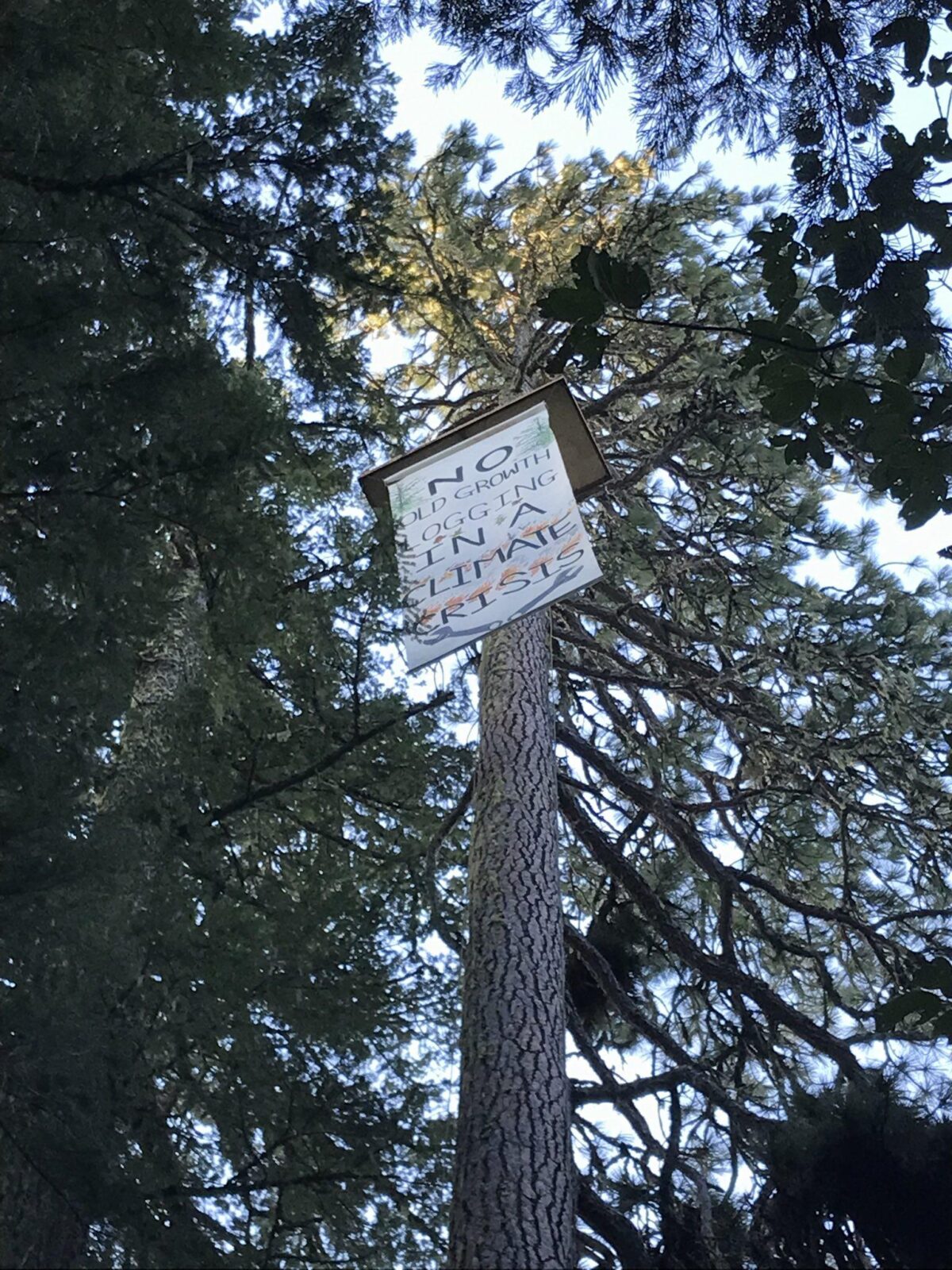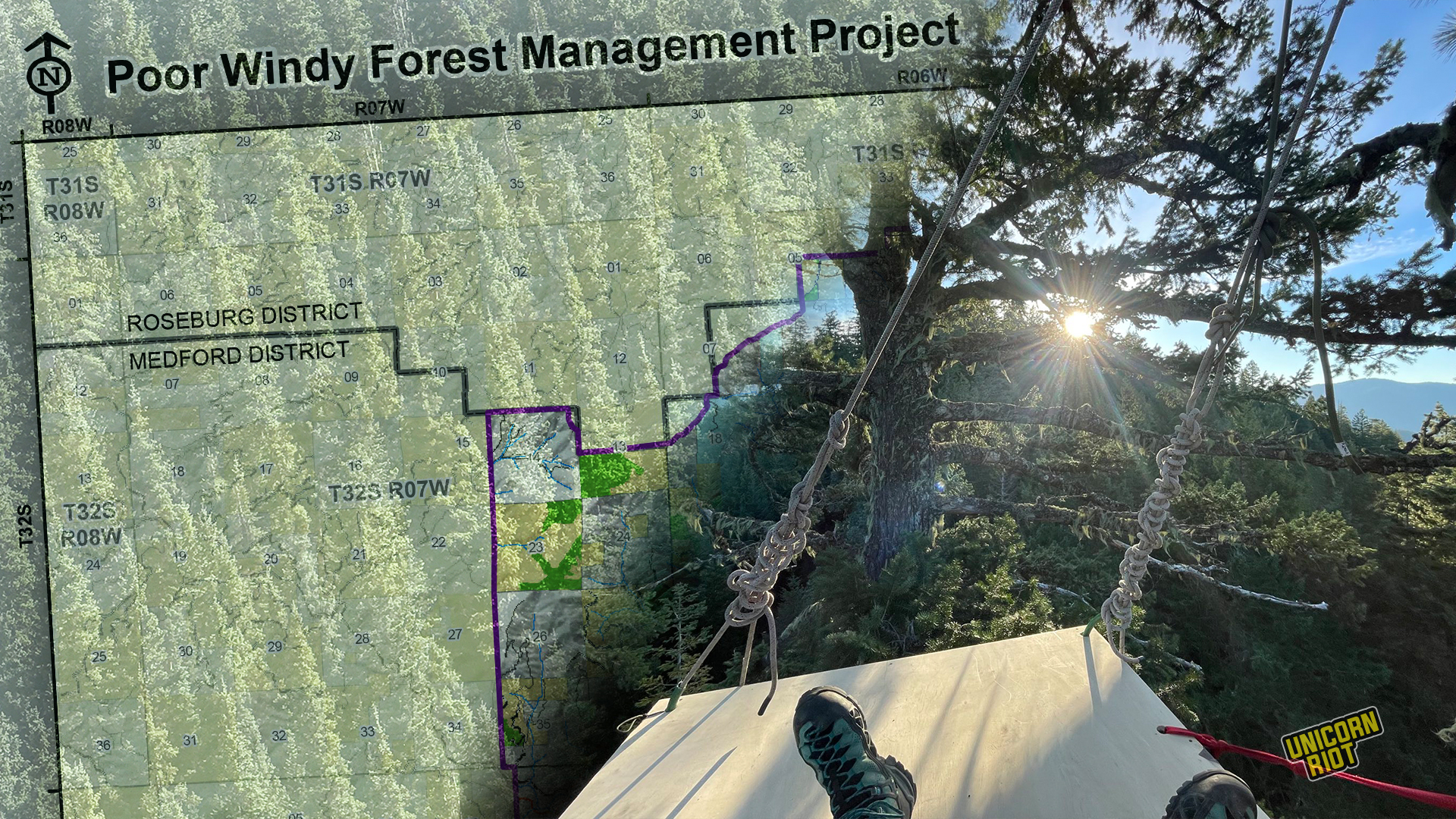Forest Defenders Launch Tree Sit to Stop Old Growth Logging in Oregon
Josephine County, OR — In rural southern Oregon, community members are reigniting a dormant battle against logging.
On the morning of April 1, a group of activists walked onto federally-managed public lands set to be logged. Climbers scaled an old growth ponderosa pine and hoisted a wooden platform over 100 feet into the air, suspended from the tree. It’s from this perch that a protester is now blocking access to a swathe of old growth forest at risk of being cut down.
The blockade is preventing logging that’s part of the Poor Windy Forest Management Plan. The plan, overseen by the Bureau of Land Management (BLM), includes 15,000 acres of forest to be logged in Josephine County, Oregon. And while mature and old growth trees are supposed to be protected from logging under federal regulations, activists say the agency is using a common workaround to cut the ancient stand.
“Last year… 25% of the timber volume in the Medford district came from what they call ‘add on volume’, which are trees that are cut from the construction of new logging roads and landings,” Salal Golden, who’s sitting in the treetop platform, told Unicorn Riot.
To prevent this, a group of organizers with Siskiyou Rising Tide, alongside a collective of forest defenders from Eugene, OR known as WRENCH, launched the action to stop loggers from cutting the ancient trees and hinder access to a portion of the timber sale which threatens the ecology of the region.
Amid climbing global temperatures and increasingly severe forest fires, protesters say that continuing logging, especially in carbon-dense and fire-resistant old growth forests, is unacceptable.
“Basically the statewide landscape has gotten so bad people couldn’t sit by any longer,” Sam Shields, an organizer with the Poor Windy tree sit, told Unicorn Riot.
The state has a long history of logging. Hillsides throughout the region lie bare from decades of timber harvesting, much of which was completed during the industry’s peak in the 20th century. But logging in Josephine County – and Oregon as a whole – is far from history.

Though the Biden administration has pledged to protect old growth forests on federal lands, the BLM is currently overseeing at least 10 sales across the state that directly threaten old growth and mature trees. The sales put as much as 788,000 acres of BLM-managed lands in Oregon’s Coast Range at risk for logging.
But while logging has long been present in the region, so has resistance to it. The “timber wars” of the 1990s saw pitched battles between federal land management agencies, like the BLM and Forest Service, timber companies, and radical environmentalists like those with Earth First!
For years, activists blockaded forest roads, occupied timber sale areas and sabotaged equipment to stop clear cut logging in Oregon and Northern California. Direct action, alongside legal efforts and other forms of protest, played a part in the development of the Northwest Forest Plan, which reduced logging operations in Oregon, Washington and California by as much as 80 percent and restructured how the Northwest’s public lands are managed.
“This tree sit is informed by decades of rich forest defense history in Southern Oregon, and across the region,” Golden, the tree sitter, said.
The Poor Windy tree sit is the first blockade against logging in Josephine County since activists with Earth First! barricaded a road to stop the Biscuit salvage timber sale in October 2004. The Poor Windy sit may be the first in a series of actions against logging that threatens old growth trees in the region, and forest defenders plan to learn from past struggles.
“When you’re in a place so steeped in movement history, we can be inspired by those folks who’ve come before us, and hopefully learn from their mistakes as well. We don’t have to do things the same way as Earth First in the 1980s – we’re keeping that no compromise attitude while building a new network of resistance,” Golden said.
Follow us on X (aka Twitter), Facebook, YouTube, Vimeo, Instagram, Mastodon, Threads, BlueSky and Patreon.
Please consider a tax-deductible donation to help sustain our horizontally-organized, non-profit media organization:



